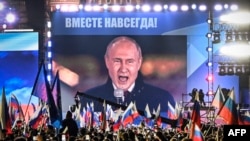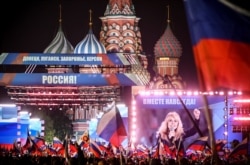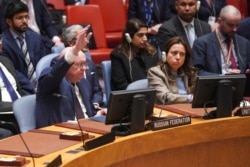Ahead of Russian-staged sham elections last week, the Kremlin promised that Ukrainian would remain an official language in annexed areas of that country, along with Russian.
Leaders of the Russian occupational authorities in Ukraine’s Zaporizhzhia and Kherson also made the same promises once their provinces were “integrated” into Russia.
“Ukrainian will remain an official language. … We are not fighting with languages,” Vladimir Rogov, chairman of the “We Are With Russia” movement in Zaporizhzhia, told the state news agency TASS on October 3.
In June, before Ukraine mounted successful counterattacks against Russian forces across the front, Kremlin press secretary Dmitry Peskov also said the Ukrainian language would stand as an official language in the eastern Donbas region. “Its status will depend on the peoples’ own choice,” Peskov said.
Well, those pledges turned out to be false.
After Russian President Vladimir Putin signed papers illegally annexing four Ukraine provinces this weekend, the country’s legislature set about erasing the whole official language thing.
On October 2, Putin tasked Andrey Klishas, a ranking member of the Federation Council, the upper house of Russia’s parliament, with amending the nation’s constitution to include the occupied Ukrainian territories. The council is scheduled to vote on the package October 4.
Klishas wrote on the Telegram messaging service that Ukrainian will lose its status as an official state language. “Nobody is going to ban the Ukrainian language, but it won’t be granted an official status either,” Klishas said, according to the Russian Defense Ministry’s Zvezda TV channel.
On October 2, Russia’s Constitutional Court in Moscow ruled the annexations legal, even though they violate international law and have been condemned by the United Nations secretary general and many countries. The next day, the parliament ratified the annexations “with more votes in favor than deputies present,” the independent Russian outlet Meduza reported.
Russian news outlets said the currency in these occupied/annexed areas will be the ruble, armed militia will become part of the Russian military, and Russian federal administrators, judges and prosecutors will be installed by June 1, 2023.
Russia now recognizes national borders where the front lines of conflict were on the day of each referendum, the new amendments say. That border was short-lived in Lyman, a city in partly occupied Donetsk province that Ukrainian forces recaptured on October 2.
Notably, one of the false pretexts Russia cited before its all-out invasion of Ukraine in February was a complaint that the Ukrainian state was run by Nazis who were “banning” the Russian language and committing atrocities against Russians.
In late September, the head of the Russian occupation administration in Ukraine’s Kherson region also promised that Ukrainian would have “equal” status with the Russian language.
On September 30, Russia vetoed a U.N. Security Council resolution to unconditionally condemn the annexations. The U.N. described the unlawful annexations as “a threat to international peace and security.”







